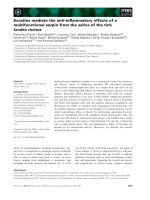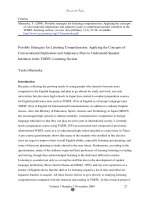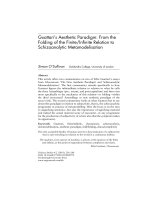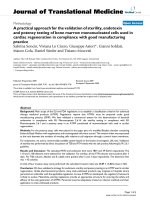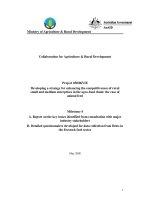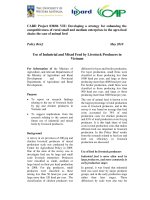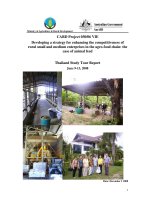Extending past research in extra role behavior unleasing a new paradigm from the prism of knowledge sharing and whistleblowing
Bạn đang xem bản rút gọn của tài liệu. Xem và tải ngay bản đầy đủ của tài liệu tại đây (1.35 MB, 217 trang )
EXTENDING PAST RESEARCH IN EXTRA-ROLE
BEHAVIOR THROUGH THE PRISM OF KNOWLEDGE
SHARING AND WHISTLEBLOWING
KAMDAR DISHAN
(BBA.(Hons.), NUS)
(MSc.(Mgt.), NUS)
A THESIS SUBMITTED FOR THE DEGREE OF DOCTOR
OF PHILOSOPHY (MANAGEMENT)
SCHOOL OF BUSINESS
NATIONAL UNIVERSITY OF SINGAPORE
2004
Acknowledgements
The process of doing this dissertation has been extremely arduous and its
completion would have been impossible if not for the following special people. Firstly and
foremost, I would like to thank My Family, for their love, blessings, encouragement and
prayer for my success. “Hope I’ve done you proud.” To my “little partners,” Dhruv
(Munna), Jitisha (Roshan), Shiv (Chattaan), and Jai (Ishu) for being my source of
inspiration and determination! To my wife Sejal for her unfailing support, love and
understanding.
I am extremely grateful to Dr Chia Ho Beng, who has been a very helpful person
to me in the process of doing this dissertation. He has been not only my supervisor, but
also my mentor (for his right guidance and sound advice), my teacher (for imparting his
research skills to me) and my friend (for being very approachable and for being a good
listener). I would also like to express my profound gratitude to Dr Glenn Nosworthy for
his help and support through out this academic exercise. Dr Glenn, your contributions to
this study really made a big difference and I am very grateful to your untiring efforts and
vital advises. Not to mention, your untiring efforts in proofreading my dissertation several
times.
A special thanks to Mr B.R. Mehta and his team, who participated in my surveys
and, despite many pressures on their time, filled in the questionnaire and provided the
information that formed the basis of this study. Mr Mehta, I thank you for patiently
allowing me to “disrupt” your subordinates’ work schedule, and encouraging them to
respond to my questionnaires.
I am also very grateful to the following people, who had helped me in getting
appointments with various companies in Mumbai, vide their contacts. I take this
opportunity to specially thank “Kakukaka”, Prashant, Kalpesh, Jyotiben, Yogita, Nikita,
Harshit, Hemali, Kajal and Viral for all their untiring efforts in getting companies to
participate in my survey.
All and above, I thank God for His Blessings.
Hereby, I dedicate my Dissertation to all these people mentioned
above.
i
Table of Contents
Topics Page No.
INTRODUCTION 01
BIBLIOGRAPHY 10
Study 1 18
ABSRACT 19
CHAPTER 1: INTRODUCTION AND LITERATURE REVIEW 20
1.1 Introduction 20
1.2 Sharing knowledge 22
1.3 Rewards and knowledge sharing 24
1.4 Closeness of ties and rewards 29
1.5 Personal orientation and motives 31
1.5.1 Impression Management 33
1.5.2 Machiavellianism 35
CHAPTER 2: RESEARCH METHODOLOGY 39
2.1 Sample 39
2.2 Procedure 39
2.3 Treatment conditions and dependent variables 40
2.4 Impression management motive and Machiavellianism 42
measures
2.4.1 Confirmatory factor analysis 43
CHAPTER 3: RESULTS 45
3.1 Hypotheses testing 45
CHAPTER 4: DISCUSSION 60
4.1 Discussion 60
4.2 Managerial implications 64
4.3 Limitations and directions for future research 65
BIBLIOGRAPHY 71
APPENDIX 1: SAMPLE SCENARIOS 86
ANNEX 1: BRIEF PROFILE OF INTERVIEWEES 89
ii
Table of Contents
Topics Page No.
ANNEX 2: ANALYTICAL CONCEPTS AND ASSUMPTIONS OF 90
EXCHANGE THEORIES
Study 2 91
ABSRACT 92
CHAPTER 1: INTRODUCTION AND LITERATURE REVIEW 93
1.1 Purpose for this study 93
1.2 Salience of knowledge sharing in the knowledge 95
management equation
1.3 Background 97
1.3.1 Obstacles to knowledge sharing 97
1.3.2 Knowledge sharing and expectations of rewards 97
1.3.3 Economic exchange, motivation and incentives 99
1.3.4 Ties and knowledge sharing 101
1.3.5 The role of impression management 103
personality- self-monitoring
CHAPTER 2: RESEARCH METHODOLOGY 107
2.1 Sample 107
2.2 Design, procedure and measures 108
CHAPTER 3: RESULTS 112
3.1 Contextual variables 112
3.2 Hypotheses testing 115
CHAPTER 4: DISCUSSION 129
4.1 Discussion 129
4.2 Conclusions and implications 132
4.3 Limitations 133
BILBLIOGRAPHY 136
APPENDIX 1: SAMPLE SCENARIOS 149
iii
Table of Contents
Topics Page No.
Study 3
151
ABSTRACT 152
CHAPTER 1: INTRODUCTION AND LITERATURE REVIEW 153
1.1 Whistleblowing 153
1.2 Situational factors (assurance of anonymity) and 157
whistleblowing
1.3 Motives and whistleblowing 160
1.3.1 Organizational concern motive 161
1.3.2 Prosocial values motive 163
CHAPTER 2: RESEARCH METHODOLOGY 167
2.1 Sample 167
2.2 Experimental design 167
2.3 Procedure and materials 169
2.4 Exploratory factor analysis for motives scales 170
CHAPTER 3: RESULTS 171
3.1 Demographics and descriptive statistics 171
3.2 Manipulation checks 171
3.3 Hypotheses testing 173
CHAPTER 4: DISCUSSION 181
4.1 Discussion 181
4.2 Limitation and future research 184
BIBLIOGRAPHY 188
APPENDIX 1: FACTOR STRUCTURE OF MOTIVE ITEMS 197
ANNEX 1: SAMPLE SCENARIOS 198
CONCLUSION 200
BIBLIOGRAPHY 204
iv
List of Tables – Study 1
Table Page No.
Table 1: Pearson’s Correlation, Cronbach's Alpha, Means,
and Standard Deviation.
45
Table 2: Repeated Measures ANOVA: Intention to Share
Information.
46
Table 3: Means, Standard Deviations and Confidence
Intervals for the 2 –way Interaction Between Appraisal and
Bonus.
48
Table 4: Sheffe’s Post Hoc Comparisons: Sharing
Information with Close Friends
49
Table 5: Sheffe’s Post Hoc Comparisons – Sharing
Information with Coworkers.
50
Table 6: Interaction Effects Between Appraisal and Person
Variables (Centered on Their Means) on Sharing Intentions
with Co-workers.
53
Table 7: Interaction Effects Between Appraisal and Person
Variables (Centered on Their Means) on Sharing Intentions
with Close-Friends.
54
Table 8: Standardize Beta for Regression of Appraisal
Condition, Predictors, and Interaction Terms on Sharing
Intentions
55
v
List of Tables – Study 2
Table Page No.
Table 1: Responses Across Incentive Conditions 113
Table 2: Contextual Variables Across Incentive Conditions 114
Table 3: Univariate Analyses of Incentives on Knowledge
Sharing
116
Table 4: Standardized Beta for Regression of Self-
monitoring, and Inducements, and Interaction Terms on
Willingness to Share Knowledge with Coworker-Friends,
Coworkers in Unit and Coworkers in Other Units.
122
Table 5: Unstandardized Betas for Simple Slope Analyses
Exploring Inducement conditions x Self-Monitoring (SM)
Interactions.
126
vi
List of Tables – Study 3
Table Page No.
Table 1: Pearson’s Correlation, Cronbach's Alpha, Means,
and Standard Deviation.
172
Table 2: Manipulation Checks Across Anonymous
Conditions
173
Table 3: ANCOVA: Dependent Variable: Whistleblowing
Intentions
174
Table 4: Interaction Effects of Anonymity Condition on the
Relationship Between Motives (centered on means) and
Whistleblowing Intentions
177
Table 5: Unstandardized Beta for Regression of
Anonymous Condition, Predictors (centered on means),
and Interaction Terms on Whistleblowing Intentions
178
Table 6: Simple Slope Analysis for Interactions Between
Motive Variables and Anonymity Factor in Predicting
Whistleblowing Intentions.
180
vii
List of Figures – Study 1
Figure Page No.
Figure 1: Two-way Interaction Effects Between Appraisal
and Bonus on Sharing Intention.
48
Figure 2: Interaction Between Appraisal, Bonuses and
Knowledge Sharing with Close Friends
51
Figure 3: Interaction Between Appraisal, Bonuses and
Knowledge Sharing with Coworkers
51
Figure 4: Interaction Between Appraisal Condition and
Impression Management in Predicting Knowledge Sharing
with Coworkers
56
Figure 5: Interaction Between Appraisal Condition and
Machiavellianism in Predicting Knowledge Sharing with
Coworkers
56
viii
List of Figures – Study 2
Figure Page No.
Figure 1: Effects of Incentives on Knowledge Sharing with
Various Organizational Recipients.
118
Figure 2: Knowledge Sharing with Close Friends,
Coworkers in Ones’ Unit, and Coworkers in Other Units
Across Incentive Conditions.
118
Figure 3a: Moderating Effect of Self-Monitoring (SM) on
Relation Between Incentives and Knowledge Sharing With
Close Friends.
123
Figure 3b: Moderating Effect of Self-Monitoring (SM) on
Relation Between Incentives and Knowledge Sharing With
Coworkers in Other Units.
123
Figure 3c: Moderating Effect of Self-Monitoring (SM) on
Relation Between Incentives and Knowledge Sharing With
Coworkers in Unit.
124
Figure 4: Summary Graph: Comparison of Low and High
Self-Monitors on Knowledge Sharing Under Different
Incentive Conditions
125
ix
List of Figures – Study 3
Figure Page No.
Figure 1: Moderating Effect of Whistleblower Anonymity on
Relation Between Organizational Concern Motive and
Whistleblowing Intentions.
179
Figure 2: Moderating Effect of Whistleblower Anonymity on
Relation Between Prosocial Values Motive and
Whistleblowing Intentions.
179
x
Summary
This dissertation attempts to adopt an interactionist approach on extra-role
behavior with a series of 3 independent, experiment-based field studies; 2 studies
centered on knowledge sharing and 1 study on whistleblowing. Study 1, based on a
sample of 295 engineers, investigates and compares the effectiveness of performance
appraisal vs. performance bonuses in facilitating knowledge sharing as well as the
moderating roles of impression management, Machiavellianism, and the potential
beneficiaries of the knowledge sharing. Including knowledge sharing in the appraisal
system had a stronger impact on whether employees would be willing to share knowledge
than the provision of bonuses; however, the impact varied according to whether the co-
workers were considered close friends as well as the personality and motives of the
employee. Overall, results showed that Machiavellians responded instrumentally, whereas
impression managers’ responses were consistent with a desire to maintain a public image
Study 2 (a follow up and extension of Study1), involving 150 engineers, explores
the joint effects of employee self-monitoring disposition and explicit incentives for
increasing employees’ willingness to share knowledge across various beneficiaries in a
work setting. I found that the presence of incentives was highly effective at increasing
employees’ willingness to share work-related knowledge and that recognition-based
incentives were, overall, as effective as pay-based incentives. However, for high self-
monitors, recognition-based incentives were more effective than pay-based incentives.
Willingness to share knowledge also varied according to whom the recipient would be
(coworkers who are friends, coworkers in one’s work unit, or other employees in the
organization). These findings highlight the importance of considering motivation and
xi
incentives when implementing knowledge management systems, as well as the critical
role of individual differences in impression management concerns.
Study 3, involving 102 engineers, examined the role of organizational directed
motives (motives of organizational concern) and co-worker directed motives (motives of
pro-social values) on the intention to report company wrongdoings anonymously vs. non-
anonymously. Results showed that organization-directed sentiments and whistleblowing
intent were negatively correlated in the non-anonymous condition while uncorrelated in
the anonymous condition; however, coworker-directed sentiments and whistleblowing
intent were negatively correlated in the anonymous condition while uncorrelated in the
non-anonymous condition. These results demonstrate the importance of person-situation
interaction in whistleblowing research. The findings are interpreted in terms of
individual’s level of affect toward organization vs. co-workers and target of self-
presentation (organization vs. co-workers).
Overall, findings across the 3 independent studies highlight the usefulness of
considering the joint effects of dispositional and situational factors in studying extra-role
behaviors. Results demonstrated that person-by-situation interaction effects could explain
a substantial amount of variance over and above either personality or situational variance
taken separately. From a theoretical perspective, the 3 studies reported in this dissertation
provides further support for the proposition of Mischel and Shoda (Mischel & Shoda,
1998, Shoda & Mischel 2000) that personality / disposition should be conceptualized in
terms of patterns of cognition, affect, and behavior that a person accesses for a particular
situation rather than across situations.
Keywords: Extra-role behavior, knowledge sharing, whistleblowing, motives,
inducements, personality.
xii
Introduction
Discretionary behaviors are fundamental when we investigate work behaviors.
The paradigm of ‘discretionary work behavior’ is conceivably one of the most significant
behavioral constructs in organizational science (Katz, 1964; Katz & Kahn, 1966). As a
result, there has been growing emphasis in the organizational behavior literature on
discretionary behavior, or employee behavior that goes beyond role expectations in a way
that is organizationally functional. Scholars have argued that this phenomenon is critical
for organizational effectiveness because managers cannot foresee all contingencies or
fully anticipate the activities that they may desire or need employees to perform (Katz &
Kahn, 1966; Morrison & Phelps, 1999; Organ, 1988). Given the recognized importance of
discretionary behaviors such as organizational citizenship behavior (Organ, 1988),
prosocial organizational behavior (Brief & Motowidlo, 1986), civic organizational
behavior (Graham, 1991), organizational spontaneity (George & Jones, 1997), contextual
performance (Borman & Motowidlo, 1993), principled organizational dissent (Graham,
1986), taking charge at work (Morrison & Phelps, 1999), voice (Van Dyne & Lepine,
1998) and whistleblowing (Miceli & Near, 1992) numerous studies have focused on
identifying factors that predict this phenomenon (refer to Organ & Ryan (1995) and
Podsakoff, MacKenzie, Paine, & Bachrach (2000) for a comprehensive review).
While we have seen various forms of discretionary behaviors studied hitherto,
scholars have predominantly conceived these behaviors as a uni-dimensional construct,
classified as extra-role behavior. Extra-role behavior is defined as behavior that benefits
the organization and/or is intended to benefit the organization, which is discretionary and
goes beyond existing role expectations (Van Dyne, Cummings & Parks, 1995). According
1
to Van Dyne et al., (1995), this definition highlights the important point that extra-role
behavior is not simply behavior that is outside role expectations within the organization;
the behavior must be directed towards or be seen as benefiting the organization.
With the initial articulation of extra-role behavior by Barnard (1938), Katz (1964)
and Katz and Kahn (1966), researchers have progressively recognized the importance of
such behaviors as it hold promise for long term organizational success. Moreover, extra-
role behavior is becoming increasing important to organizations today as they attempt to
meet the challenges of a highly competitive business environment. For instance, the
challenge of global competition highlights the importance of organizational innovation,
flexibility, productivity, and responsiveness to changing external conditions (Podsakoff,
Ahearne, & MacKenzie, 1997; Podsakoff & MacKenzie, 1997; Van Dyne, Graham, &
Dienesch, 1994). Furthermore, in an increasingly dynamic business environment,
organizations must rely on employee initiative, responsibility and flexibility in order to
remain competitive (Kanter, Stein, & Jick, 1992; Katz & Kahn, 1966; LePine & Van
Dyne, 2001). Recent emphasis on flattened organizational structure, empowerment, and
self-managed work teams (Galbraith, 1994; Howard, 1995; Mohrman & Cohen, 1995;
Robert, Probst, Martocchio, & Drasgow, 2000) also highlight the importance of
cooperative, discretionary behavior at all levels of the organization (LePine & Van Dyne,
2001; Van Dyne & LePine, 1998).
Given the clear importance of extra-role behavior to an organization, there has
been great proliferation of research in this domain. Researchers have suggested and found
important relationships between extra-role behavior and other constructs such as
personality (Borman, Penner, Allen, & Motowidlo, 2001; Miceli & Near, 1988; Organ &
2
Ryan, 1995), satisfaction (Bateman & Organ, 1993; Lowery, Beadles, & Krilowicz,
2002), commitment (Cropanzano, Rupp, & Byrne, 2003; O’Reilly & Chatman, 1986),
perception of fairness (Farh, Podsakoff, & Organ, 1990; Folger, 1993; Moorman,
Niehoff, & Organ, 1993) perceptions of pay equity (Organ & Konovsky, 1989),
organizational structure (King, 1999) intrinsic and extrinsic job cognitions (Williams
& Anderson, 1991), individual performance ( Allen & Rush, 1998; George, 1990, 1991;
LePine & Van Dyne, 2001; MacKenzie, Podsakoff, & Fetter, 1991; Puffer, 1987;
Schnake & Dumler, 1997; Scholl, Cooper, & McKenna, 1987), global performance
(Graham, 1991), work group performance (Bachrach, Bendoly & Podsakoff, 2001;
George & Battenhausen, 1990; Karambayya, 1991), moral development (Brabeck, 1984;
Kidder & McLean Parks, 2001), ethical judgments (Chiu, 2003; King, 2001), leader
behaviors (MacKenzie, Podsakoff, & Rich, 2001; Podsakoff, MacKenzie, Moorman, &
Fetter, 1990; Smith, Organ, & Near, 1983), contextual factors (Dozier & Miceli, 1985;
Karambayya, 1991; Perrucci, Anderson, Schendel, & Trachtman, 1980), perceived
competition among peers (Puffer, 1987), retaliation (McLean Parks & Kidder, 1994;
Near & Jensen, 1983), group cohesiveness and socialization process (George &
Battenhausen, 1990), covenantal relationships (Van Dyne et al., 1994), work group
climate (George, 1991) and international culture (Smith et al., 2002; Tavakoli, Keenan,
& Crnjak-Karanovic, 2003)
However, despite the upsurge in extra-role behavior research, researchers (Van
Dyne et al., 1995) have recently cautioned that extra-role behavior may not be a uni-
dimensional construct (as being conceived in most past research) and suggested that most
extra-role behaviors fall under two natural categorizations, ‘promotive’ vs. ‘prohibitive’
extra-role behaviors.
Promotive behaviors are proactive; they promote, encourage, or
3
cause things to happen. Prohibitive
behaviors are protective and preventative; they
include interceding to protect those with less power as well as speaking out to stop
inappropriate or unethical behavior.
Behaviors such as helping, sharing work and knowledge and cooperating with
coworkers are primarily ‘promotive’ behaviors (e.g., organizational citizenship behavior
and prosocial behavior). Although ‘promotive’ extra-role behaviors are important, Van
Dyne et al., (1995) argued that they are not sufficient for ensuring the continued viability
of an organization and that organizations also need employees who are willing to exhibit
‘challenging/prohibitive’ extra-role behaviors (e.g., principled organizational dissent and
whistleblowing), which fundamentally challenges the present state of operations by
preventing or prohibiting illegal or unprincipled behaviors in the organizations.
Van Dyne et al., (1995) highlighted that ‘promotive’ and ‘prohibitive’ extra-role
behaviors are relatively different constructs with different antecedents and consequences.
According to them, researchers ought to acknowledge that extra-role behavior is a multi-
dimensional construct and future research should be focused on specific types of extra-
role behaviors (such as ‘promotive’ vs. ‘prohibitive’) rather than a more global extra-role
behavior construct. Based on their proposition, I attempt to extend the work on extra-role
behaviors by empirically exploring unique antecedents of knowledge sharing (classified
as a ‘promotive’ extra-role behavior) and whistleblowing (classified as ‘prohibitive’ extra-
role behavior) not previously explored in past extra-role behavior research.
4
This dissertation will also contribute by addressing some yet unexplored issues
1
in
the knowledge management and whistleblowing literatures through a set of 3
independent studies (these studies are intended to be taken as
completely independent in
nature and as such, each study has its own abstract, body and bibliography). These three
independent research endeavors have been undertaken with the focal objective of
investigating the interaction effects between situation x personality in predicting the
intentions to engage in knowledge sharing (in studies 1 and 2) and whistleblowing (study
3) respectively.
While there is a general dearth of empirical studies devoted to exploring
antecedents of knowledge sharing and whistleblowing, it might be worthwhile to
highlight that the theoretical underpinnings of these behaviors are analogous to other
dimensions of extra-role behavior. Both knowledge sharing and whistleblowing have
deep roots in social exchange (Organ, 1988; Moorman, 1991) as well as classical
organizational theory (Barnard, 1938; Katz & Kahn, 1966). In an attempt to relate
knowledge sharing and whistleblowing to other similar extra-role behavior constructs,
there appears to be some conceptual overlap between knowledge sharing and
organizational citizenship behavior/prosocial behavior and between whistleblowing and
voice/principled organizational dissent.
While knowledge sharing and organizational citizenship behavior may be very
much similar conceptually, the main difference between these two forms of promotive
extra-role behavior lies in that knowledge sharing entails a clear personal sacrifice in
terms on one’s competitive advantage in relation to one’s coworkers, while citizenship
1
To avoid repetitions, the gaps and shortcomings in the relevant literatures are discussed in the 3
independent studies respectively.
5
behaviors like helping, sportsmanship, civic virtue do not entail sacrificing one’s potential
‘edge’ over fellow coworkers. In essence, knowledge sharing involves one’s willingness
to ‘give up the secret of fire’ for the benefit of coworkers. Therefore unlike other forms of
organizational citizenship behaviors, knowledge sharing requires a thorough cost/benefit
analysis on the part of the employee.
Whistleblowing can be differentiated with other similar forms of prohibitive extra-
role behabiors such as voice and principled organizational dissent (although there exists
substantial conceptual overlap).
Voice is defined as non-required behavior that
emphasizes expression of constructive challenge with an intent to improve rather than
merely criticize (Van Dyne & LePine, 1998, p. 109). According to Van Dyne and LePine
(1998), voice is distinct from whistleblowing, as whistleblowing is critical and meant to
stop some activity as opposed to being constructive and meant to change (improve) some
activity. Principled organizational dissent focuses on objections based on conscientious or
moral principles rather than suggesting more effective ways of doing things. While both
whistleblowing and principled organizational dissent represent an attempt to prohibit or
stop certain behavior, whistleblowing, however concerns an illegal act while principled
organizational dissent concerns a conscientious principle held by the person observing the
misconduct.
Despite these differences, due to some conceptual overlap between these
constructs, I predict similar sets of antecedents to predict ‘promotive’ extra-role behaviors
and another set of similar antecedents to predict ‘prohibitive’ extra-role behaviors. While
I acknowledge that substantial progress that has been made in the study of situational
factors as predictors of promotive forms of extra-role behavior such as organizational
6
citizenship behavior, research on the role of individual differences on the other hand is at
an earlier stage of development (LePine, Erez & Johnson, 2002; Podsakoff et al., 2000).
This is especially true for research on promotive forms of extra-role behavior. My
argument is that individual differences both influence extra-role behaviors and moderate
the relationship between situation and ERB. Despite the fact that recent reviews of past
empirical research on promotive extra-role behavior, such as organizational citizenship
behavior have shown limited support for claims concerning systematic relationships
between general facets of temperament (i.e., the ‘big five’) and organizational citizenship
behavior (LePine, Erez, & Johnson, 2002; Organ & Ryan, 1995; Podsakoff et al., 2000), I
contend that substantive reasons exist to support continued research on individual
differences on organizational citizenship behavior as well as other forms of promotive as
well as prohibitive extra-role behaviors like knowledge sharing and whistleblowing. This
is because prior meta-analytic reviews of past research have not addressed the role of
individual difference constructs as moderating rather than main-effect variables. In
addition, we know little about antecedents of prohibitive extra-role behaviors and that if
they differ from antecedents of promotive behaviors. LePine et al’s (2002) meta analysis
did not include voice or whistleblowing, and that the authors asserted that they do not
expect voice or whistleblowing (prohibitive extra-role behaviors) to function the same
way as the other dimensions included in the meta analysis (such as helping, courtesy,
sportsmanship etc).
With the arguments enumerated above, this dissertation attempts to contribute to
the literature in two ways. Firstly, I follow up from Lepine et al’s (2002) meta analysis
and extend theory by integrating the promotive/preventive distinction that Lepine and
Van Dyne have introduced (Lepine et al., 2002; Van Dyne et al., 1995). Secondly, I
7
adopt an interactionist approach towards studying knowledge sharing and whistleblowing,
where my focal thrusts has been on investigating the interaction between situational
factors and individual differences as antecedents of these behaviors. A major gap in past
research is the general dearth of empirical work that invokes an interactionist approach to
studying extra-role behaviors.
Study 1 looks at how different forms of tangible rewards, i.e., bonuses (no bonus
vs. individual based bonus vs. team based bonus) and a form of recognition (specifically
appraising knowledge sharing vs. not) affect knowledge sharing intentions. This study
also investigated if these tangible rewards interact with dispositional variables
(specifically, impression management and Machaivellianism) to affect knowledge-sharing
intentions with respect to coworkers and close friends in other work units.
In study 2, I investigate the impact of situational and dispositional factors on
employees’ willingness to share knowledge. Specifically, I investigated the effectiveness
of explicit incentives for increasing employees’ willingness to share knowledge,
considering both tangible and intangible incentives. I also examined the moderating role
of employee self-monitoring disposition on the effects of these incentives.
Study 3 is quite different in focus from the other two. While studies 1 and 2
examined the role of situational and dispositional factors on knowledge sharing
(‘promotive’ extra-role behavior), this study in contrast, explores the role of these factors
on whistleblowing intentions (‘prohibitive’ extra-role behavior). Specifically, this study
examined the role of organizational-directed motives (organizational concern) and co-
worker directed motives (pro-social values motive) on the intention to report company
8
wrongdoings. I also explored the moderating effects of ‘whistleblower anonymity’ in
these relationships
9
Bibliography
Allen, T. D., & Rush, M. C. (1998). The effects of organizational citizenship behavior on
performance judgments: A field study and a laboratory experiment. Journal of
Applied Psychology, 83, 247-260.
Bachrach, D.G., Bendoly, E., & Podsakoff, P.M. (2001). Attributions of the causes of
group performance as an alternative explanation of the relationship between
organizational citizenship behavior and organizational performance. Journal of
Applied Psychology, 86,6, 1285-1293.
Barnard, C.I. (1938). The functions of the executive. Cambridge, MA: Harvard.
Bateman, T.S., & Organ, D.W. (1993). Job satisfaction and the good soldier: The
relationship between affect and employee “citizenship.” Academy of
Management Journal, 26, 587-595.
Borman, W.C., & Motowidlo, S.J. (1993). Expanding the criterion domain to include
elements of contextual performance, In N. Schmitt & W.C. Borman (Eds.),
Personality Selection, 71-98. San Francisco: Jossey-Bass.
Borman, W. C., Penner, L. A., Allen, T. D., & Motowidlo, S. J. (2001). Personality
predictors of citizenship performance. International Journal of Selection and
Assessment, 9, 52-69.
Brabeck, M. (1984). Ethical characteristics of whistleblowers. Journal of Research in
Psychology, 18, 41-53.
Brief, A. P., & Motowidlo, S. J. (1986). Prosocial organizational behaviors. Academy of
Management Review, 11, 710-725.
Chiu, R.K. (2003). Ethical judgment and whistleblowing intention: Examining the
moderating role of locus of control. Journal of Business Ethics, 43, 1, 65-74.
10
Cropanzano, R., Rupp, D.E., & Byrne, Z.S. (2003). The relationship of emotional
exhaustion to work attitudes, job performance, and organizational citizenship
behaviors. Journal of Applied Psychology, 88,1, 160-169.
Dozier, J.B., & Miceli, M.P. (1985). Potential predictors of whistleblowing: A prosocial
behavior perspective. Academy of Management Journal, 10, 823-836.
Farh, J.L., Podsakoff, P.M., & Organ, D.W. (1990). Accounting for organizational
citizenship behavior. Leader fairness and task scope versus satisfaction. Journal
of Management, 16, 705-721.
Folger, R. (1993). Justice, motivation and performance beyond role requirements.
Employee Responsibility and Rights Journal, 6, 239-248.
Galbraith, J. R. (1994). Competing with flexible lateral organizations (2
nd
ed.).
Reading, MA: Addison-Wesley.
George, J. M. (1990). Personality, affect and behavior in groups. Journal of Applied
Psychology, 75, 107-116.
George, J. M. (1991). State of trait: Effects of positive mood on prosocial behaviors at
work. Journal of Applied Psychology, 76, 299-307.
George, J.M., & Battenhausen, K. (1990). Understanding prosocial behavior, sales
performance, and turnover: A group level analysis in a service context. Journal of
Applied Psychology, 75, 698-709.
George, J. M., & Jones, G. R. (1997). Organizational spontaneity in context. Human
Performance, 10, 153-170.
Graham, J.W. (1986). Principled organizational dissent: A theoretical essay. In B.M. Staw
& L.L. Cummings (Eds.), Research in Organizational Behavior, 8, 1-52.
Greenwich, CT: JAI Press.
11
Graham, J.W. (1991). An essay on organizational citizenship behavior. Employee Rights
and Responsibilities Journal, 4, 4, 249-270.
Howard, A. (1995). A framework for work change. In A. Howard (Ed.), The changing
nature of work (pp. 3-44). San Francisco: Jossey-Bass.
Kanter R.M., Stein, B.A., & Jicks, R.D. (1992). The challenge of organizational change:
How companies experience it and leaders guide it. New York: Free Press
Karambayya, R. (1991). Contexts of organizational citizenship behavior: Do high
performing and satisfying units have better ‘citizens.’ York University working
paper.
Katz, D. (1964). The motivational basis of organizational behavior. Behavioral Science,
9, 131-146.
Katz, D., & Kahn, R.L. (1966). The social psychology of organizations. New
York:Wiley.
Kidder, L.K., & McLean Parks, J.P. (2001). The good soldier: Who is (s)he? Journal of
Organizational Behavior, 22, 939-959.
King, G. (1999). The implications of an organization's structure on whistleblowing.
Journal of Business Ethics, 20, 4, 315-326
King, G. (2001). Perceptions of international wrongdoings and peer reporting behavior
among registered nurses. Journal of Business ethics, 34,1, 1-13
LePine, J.A., Erez, A., & Johnson, D.E. (2002). The nature and dimensionality of
organizational citizenship behavior: A critical review and meta-analysis. Journal
of Applied Psychology,
87, 52–65.
12

